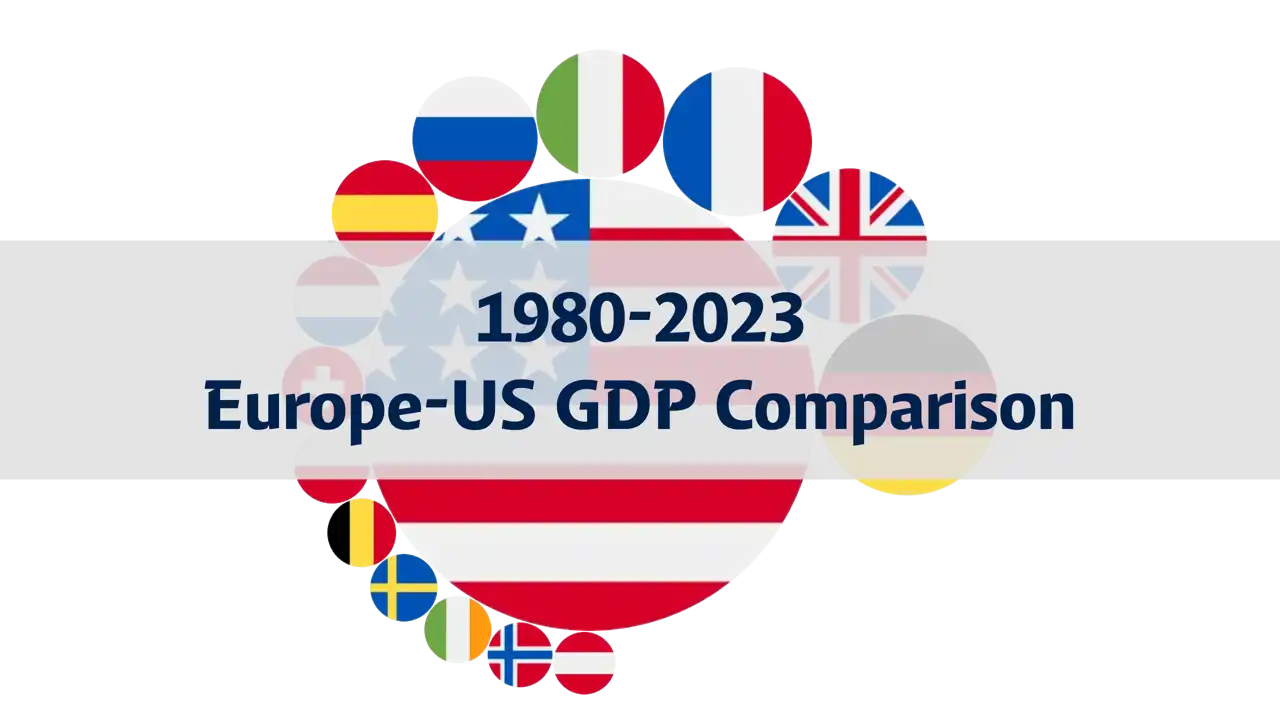
Comparing GDP of the United States and Top European Countries in 2023: A Deep Dive into the Economic Powerhouses
- ASUMUP
- National Rankings / Europe
- August 14, 2024
Gross Domestic Product (GDP) is a key indicator of a nation's economic health and power. In 2023, the global economy continues to evolve amidst challenges such as inflation, geopolitical tensions, and technological advancements. While the United States remains the world's largest economy by a significant margin, Europe hosts several economic powerhouses that play crucial roles in global trade, finance, and politics. This post will compare the GDP of the United States with the top European economies, offering insights into their economic standings and what these numbers mean in a broader context. Understanding the economic landscape of these nations provides valuable perspective on global market dynamics and future economic trends.
US vs. Europe: GDP Showdown 2023
- 1st United States - $26.9 trillion
- 2nd Germany - $4.3 trillion
- 3rd United Kingdom - $3.2 trillion
- 4th France - $2.9 trillion
- 5th Italy - $2.2 trillion
- 6th Russia - $2.1 trillion
- 7th Spain - $1.5 trillion
- 8th Netherlands - $1.1 trillion
- 9th Switzerland - $869.6 billion
- 10th Poland - $748.9 billion
10th Poland - $748.9 billion
Poland's GDP in 2023 is approximately $748.9 billion, placing it as the ninth-largest economy in Europe. Poland has experienced significant economic growth over the past few decades, transitioning from a centrally planned economy to a market-oriented one. The economy is diverse, with strong sectors in manufacturing, agriculture, and services.
Poland benefits from its strategic location in Central Europe, which makes it a crucial hub for trade and investment within the European Union. The country has also been an attractive destination for foreign direct investment, particularly in the automotive and technology industries. Despite challenges such as labor market constraints and regional disparities, Poland's economy continues to grow, with a positive outlook for the future.
9th Switzerland - $869.6 billion
Switzerland, with a GDP of approximately $869.6 billion in 2023, ranks as the eighth-largest economy in Europe. The Swiss economy is renowned for its stability, strong financial sector, and high standard of living. Switzerland is home to some of the world's leading financial institutions and multinational corporations, particularly in banking, pharmaceuticals, and luxury goods.
The country also has a highly skilled workforce and a strong emphasis on innovation, which contributes to its economic resilience. Switzerland's political neutrality and robust infrastructure further enhance its attractiveness as a global business hub. Despite its relatively small size, Switzerland punches well above its weight in terms of economic impact.
8th Netherlands - $1.1 trillion
The Netherlands has a GDP of approximately $1.1 trillion in 2023, making it the seventh-largest economy in Europe. Known for its highly developed and open economy, the Netherlands excels in sectors such as logistics, agriculture, and finance. Rotterdam, one of the busiest ports in the world, plays a crucial role in global trade.
The Dutch economy benefits from a highly skilled workforce, a favorable business environment, and strong international trade relationships. Despite being a relatively small country in terms of population, the Netherlands has an outsized economic influence, particularly within the European Union. The nation's commitment to innovation and sustainability also positions it well for future growth.
7th Spain - $1.5 trillion
Spain's economy, with a GDP of approximately $1.5 trillion in 2023, is the sixth-largest in Europe. Spain has a diverse economy, with strengths in tourism, automotive manufacturing, and agriculture. The country is one of the world's leading tourist destinations, which significantly contributes to its GDP.
Spain has faced economic challenges in recent years, including high unemployment rates and public debt. However, the economy has been gradually recovering, with efforts to modernize industries and improve competitiveness. The Spanish economy's resilience and adaptability have helped it maintain a strong position within the European Union, with continued growth prospects in various sectors.
6th Russia - $2.1 trillion
Russia's GDP in 2023 is approximately $2.1 trillion, making it the fifth-largest economy in Europe. The Russian economy is heavily dependent on natural resources, particularly oil and gas, which constitute a significant portion of its export revenues. Russia also has a substantial industrial base, with sectors like metallurgy, machinery, and defense being crucial to its economy.
The geopolitical landscape significantly impacts Russia's economy, especially with ongoing sanctions and the global shift towards renewable energy. These factors, coupled with domestic challenges such as demographic changes and economic diversification, pose significant hurdles. Despite these challenges, Russia remains a major player on the global stage, particularly in energy markets and geopolitical affairs.
5th Italy - $2.2 trillion
Italy, with a GDP of approximately $2.2 trillion in 2023, is the fourth-largest economy in Europe. Italy's economy is known for its strong manufacturing sector, particularly in automotive, fashion, and luxury goods. The country is also one of the world's leading wine producers, and tourism plays a significant role in its economic output.
However, Italy faces structural challenges, including high public debt, slow economic growth, and regional disparities between the more prosperous north and the less developed south. Political instability has also been a recurring issue, affecting economic policy and investor confidence. Despite these challenges, Italy remains a significant economic force within the European Union, with a rich cultural heritage that continues to attract global attention.
4th France - $2.9 trillion
France, with a GDP of approximately $2.9 trillion in 2023, is the third-largest economy in Europe. The French economy is well-rounded, with significant contributions from agriculture, manufacturing, and services. France is a global leader in luxury goods, aerospace, and nuclear energy. Paris, the capital, is not only a cultural hub but also an important center for business and international diplomacy.
The French government has been proactive in implementing economic reforms aimed at boosting competitiveness and employment. However, the economy faces challenges such as high public debt, social unrest, and a need for further labor market reforms. Despite these hurdles, France's position as a key player in both the European Union and the global economy remains solid.
3rd United Kingdom - $3.2 trillion
The United Kingdom ranks as the second-largest economy in Europe with a GDP of approximately $3.2 trillion in 2023. The UK's economy is diverse, with significant contributions from finance, services, and technology sectors. London, as one of the world's leading financial centers, plays a crucial role in the global economy. The UK has also been a hub for innovation, particularly in fields like fintech, biotechnology, and creative industries.
Despite the challenges posed by Brexit, which led to significant shifts in trade relations and regulatory landscapes, the UK economy has shown resilience. The government's strategies to attract foreign investment and enhance trade relations beyond Europe are key to maintaining its economic position. The UK's GDP reflects both its enduring strengths and the ongoing adjustments to its post-EU reality.
2nd Germany - $4.3 trillion
Germany stands as the largest economy in Europe and the fourth largest globally, with a GDP of around $4.3 trillion in 2023. Known for its robust manufacturing sector, particularly in automotive and industrial machinery, Germany has a strong export-oriented economy. The country's economic stability is further bolstered by its well-developed infrastructure, highly skilled labor force, and a strong emphasis on research and development.
However, Germany faces challenges such as an aging population, energy transition issues, and economic pressures from global trade dynamics. Nonetheless, its economy remains a cornerstone of the European Union, influencing economic policies across the continent. Germany's economic health is crucial for the stability of the Eurozone and the broader European economy.
1st United States - $26.9 trillion
The United States maintains its position as the largest economy in the world with a GDP of approximately $26.9 trillion in 2023. This massive figure is reflective of the country's diverse and dynamic economy, which is driven by sectors such as technology, finance, healthcare, and consumer goods. The US economy benefits from a large consumer base, a strong innovation ecosystem, and significant global influence in international trade and finance.
Despite facing challenges such as inflation, political polarization, and a slowing global economy, the United States continues to exhibit resilience. Its economic policies, strong infrastructure, and leading position in technology and innovation make it a dominant player on the world stage. The sheer size of the US economy dwarfs that of any individual European nation, making it a critical driver of global economic trends.
Other Posts in the National Rankings / Europe
| Comparing GDP of the United States and Top European Countries in 2023: A Deep Dive into the Economic Powerhouses |
|---|
| Europe's Top GDP Rankings for 2023: Which Economies Lead the Continent? |
Categories
- National Rankings(43)
- Science & Technology(1)
- Sports(24)
- Economy(30)
- Society(12)
- Culture(7)
Recent Posts
![Bayern Spent HOW MUCH on Harry Kane?! Ranking Their Top 10 Biggest Signings Ever]() A deep dive into Bayern Munich's ten most expensive transfers, exploring how the club's spending strategy has evolved to chase European glory.
A deep dive into Bayern Munich's ten most expensive transfers, exploring how the club's spending strategy has evolved to chase European glory.![Arsenal's Record-Shattering Spree: From a €116M Gamble to a Flop, Who Was Worth the Cash?]() A deep dive into Arsenal's top 10 most expensive signings, analyzing the successes, the failures, and the massive fees that have defined the club's modern transfer strategy.
A deep dive into Arsenal's top 10 most expensive signings, analyzing the successes, the failures, and the massive fees that have defined the club's modern transfer strategy.![Chelsea Cashes In BIG TIME! Who Really Won the 25/26 Summer Transfer Window Money Game?]() A deep dive into the top 10 clubs that made the most money from player sales during the wild 25/26 summer transfer window.
A deep dive into the top 10 clubs that made the most money from player sales during the wild 25/26 summer transfer window.![Liverpool's Record-Breaking €483M Spree! Did They Just Buy the Premier League Title?]() A deep dive into the 25/26 summer transfer window reveals Liverpool's record-breaking spending spree as Premier League clubs continue to dominate the market.
A deep dive into the 25/26 summer transfer window reveals Liverpool's record-breaking spending spree as Premier League clubs continue to dominate the market.![You Won't Believe How Much a Loaf of Bread Costs in These Countries! (Spoiler: It's INSANE)]() This post explores the top 10 countries with the most expensive bread, revealing how factors like import reliance and tourism dramatically inflate the cost of this basic staple.
This post explores the top 10 countries with the most expensive bread, revealing how factors like import reliance and tourism dramatically inflate the cost of this basic staple.
















